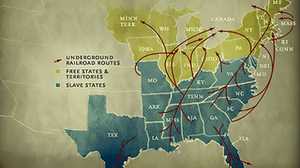The Battle for Abolition
Some Americans had opposed slavery since colonial times. In 1777, Vermont was the first U.S. territory to ban slavery, and the state of Pennsylvania followed suit in 1780. By 1804, Northern states had voted to abolish slavery within their borders. In the half century leading up to the Civil War, white and black activists, women and men worked together under the abolitionist umbrella, though not always in harmony. Abolitionists put forward a wide range of approaches to end slavery, from moral persuasion to boycotts to the endorsement of violent rebellion. Read profiles of three of the movement's prominent activists.

William Lloyd Garrison stated his intentions clearly in the first issue of The Liberator, the anti-slavery newspaper he founded in 1831: "I do not wish to think, or speak, or write with moderation... I am in earnest — I will not equivocate — I will not excuse — I will not retreat a single inch — AND I WILL BE HEARD." Despite the fact that his power eventually waned, he would be remembered as one of the most radical abolitionists.
Garrison believed that slavery was a moral issue. He saw immediate release of all slaves, or Immediatism, as the only justifiable solution to the slavery issue. His positions grew more radical as time passed. He called for Northern secession from the slaveholding South, urged abolitionists to refuse to vote or participate in government in any way, and lashed out against organized religion, which he believed upheld slavery. He lionized John Brown as a hero. He publicly burned a copy of the Constitution, which he viewed as a pro-slavery document. His radicalism helped fragment the abolition movement, yet his consistent, unyielding approach to slavery made him one of the most feared — and reviled — abolitionists in America.
James Gillespie Birney believed that political action and the power of religion were the keys to ending slavery. Born in Kentucky to a slaveholding family, he freed his slaves and went on to become one of the nation's most prominent abolitionists. As a legislator in Alabama, Birney proposed measures that would allow the legislature to emancipate slaves and prohibit selling slaves brought into the state. Driven from the South after trying to set up an abolitionist newspaper, he moved North, where he was elected executive secretary of the American Anti-Slavery Society.
Birney's ideas about achieving abolition using political means and moral suasion caused friction with William Lloyd Garrison, who encouraged his followers to boycott politics and adopted an anti-clerical position. In 1840, Birney joined those who left Garrison's group to form the Liberty Party. Birney was the party's presidential nominee in 1840 and 1844. Although he was not elected, Birney received more than 60,000 votes in his second run. He continued his anti-slavery campaign, serving as vice president of the World Anti-Slavery Convention and writing a book entitled The American Churches the Bulwarks of American Slavery. Birney died in 1857.
Frederick Douglass believed that both moral arguments and political action should be used in the fight to achieve abolition. Born into slavery some time around 1817, Douglass escaped bondage in 1838 and became one of the most eloquent voices of the abolition movement. He spoke forcefully against the evils of slavery, both in America and abroad.
In his autobiography and his newspaper, the North Star, Douglass revealed the cruel nature of slavery to the American public. In 1848, he attended the first women's rights convention in Seneca Falls, New York. His position on women, as well as his belief that political power should be used to help achieve abolition, caused a rift between him and William Lloyd Garrison.
During the Civil War, Douglass served as an unofficial liaison between African Americans and Abraham Lincoln, encouraging Lincoln to allow African Americans to fight for the Union. After the war, Douglass continued his relentless campaign for civil rights, working to help freedmen in the South. He died in 1895 after serving in a number of government posts, including minister and consul general to Haiti.






